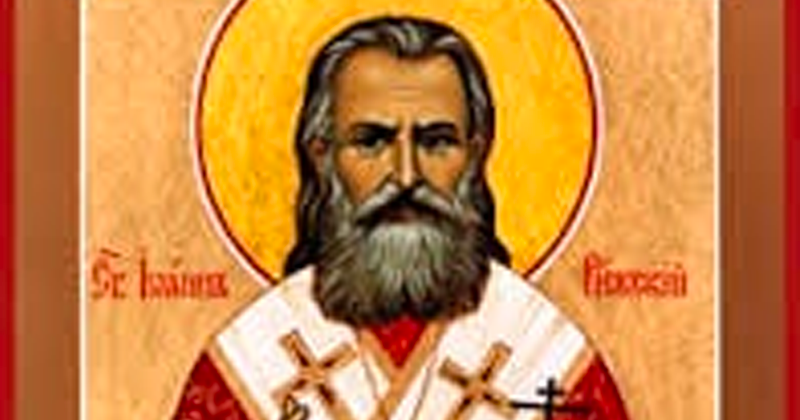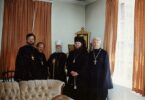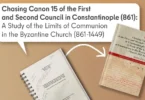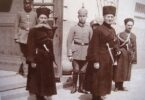Archbishop Ioann (Pommer) was born on January 6/19, 1876 in the former Lifland Province of the Russian Empire, which is now Latvia. He came from a Latvian family which had converted to Orthodoxy and went through all of the stages of theolgical education, graduating from the Kiev Theological Academy in 1904. This was followed by the usual route of a scholarly monk, with service in various places of the Russian Empire, including Holy Trinity Monastery in Vilnius, and consecration to the episcopate in 1912. In April of 1917 he was assigned to Penza to replace Archbishop Vladimir (Putiata), who had been removed by the Holy Synod in March of that year. There he had to counteract his predecessor and his followers who were unwilling, in the spirit of revolutionary attitudes, to turn over the cathedral to the new hierarch.
Due to the war and the unrest of the Revolution the Orthodox Church in the newly-formed Latvian State was without episcopal oversight, and in 1920 the Council of the Latvian clergy invited Archbishop Ioann to Riga. On July 19, 1921 Patriarch Tikhon granted to the Latvian Church, as it was on the territory of an independent nation, independence “in matters of church management, administration, education, and civil matters.” Starting in 1925 he was a delegate to the Seimas, where he actively defended the rights of the Orthodox Church and the Russian minority. On the night of October 12, 1934 Archbishop Ioann was villanously murdered under undetermined circumstances. On November 8, 1981 he was canonized by ROCOR with the host of new martyrs and confessors, and in July of 2001 by the ROC in a Church-wide manner.
Throughout all of the years of existing under the Bolshevik-Communist regime the Russian Orthodox Church had no juridical status. Thus, up until the Second World War only the renovationists, who did possess that status could go outside the borders of the USSR. In these conditions Metropolitan Elevferii (Bogoiavlenskii, 1868-1940) of Vilnius and Lithuania had special significance for the Patriarchal Locum Tenens, Metropolitan Sergii (Stragorodskii), who was isolated in Moscow. The Diocese of Lithuania turned out to be actually the only major church body which maintained submission to him beyond the USSR. After the Journal of the Moscow Patriarchate was closed down in 1935, the Voice (Golos) of the Lithuanian Orthodox Church became the only printed organ of the Russian Orthodox Church.
The following letter concerns the “Declaration” by Metropolitan Sergii of July 29, 1927 addressed to the Soviet government, as well as the subsequent demand that ecclesiastical emigres refrain from speaking out politically against the USSR. Using Lithuania as an example, Archbishop Ioann explains that submission to the “emigre diaspora, which also has major disagreements with the government,” could not have been a solution for the Latvian Orthodox Church (for the relationship with ROCOR see the interview with A. V. Gavrilin). Hieromartyr Ioann’s position obliquely confirms the hypothesis that for most of the Orthodox outside the borders of Russia their existence was determined in terms expressed in Decree no. 362 of Patriarch Tikhon, the Holy Synod, and the Supreme Church Council, dated November 20, 1920.
Most Reverend Master,
The formula regarding the situation of the Orthodox Church in Latvia which has caused you discomfort comes not from me but is taken from a document issued to me as the Primate of the of the Latvian Orthodox Church by Patriarch Tikhon and the bodies under him, namely the Synod and the Supreme Church Council. In issuing the aforesaid document to me Patriarch Tikhon, the Synod, and the Supreme Church Council found it necessary to place it on a canonical and historical basis, and, of course, they proceeded from an awareness that they possess the right to issue such a document to me, and that the issuance of such a document, given the circumstances, is undoubtedly an act that is beneficial and necessary for the Church. Since leading hierarchs and canonists took part in discussing the matter, it takes great boldness to say that the document has been published in a canonically incorrect manner. Since the document was issued by the leadership of the Russian Church totally voluntarily, and since there are absolutely no grounds to accuse Patriarch Tikhon and his collaborators of insufficient love for the Russian Church or of insufficient loyalty to her genuine interests, there are no grounds to suspect them of a thoughtless attitude toward the rights and interests of the Russian Church. Up to now neither those close to him nor those far away have had, nor do they have, absolutely any factual cause to rebuke Patriarch Tikhon and his collaborators for the high degree of trust he has granted me and the Church headed by me, and no one has up to now had absolutely any cause to rebuke or suspect me of taking advantage of the trust granted to me. I make use of the rights conceded to me, scrupulously maintaining the sense of the formulas in the document that was issued to me, not allowing any conjectures at the very least even in the verbal formulation of my canonical position. I do not use such tempting words as autocephaly or autonomy and neither do my associates. At the same time, I am, however, deeply convinced that these rights were conceded to me in a canonically sound and purposeful manner, for otherwise I would not have accepted these rights and would not have started making use of them. The Act of Patriarch Tikhon and his collaborators has ensured the possibility for the Latvian Orthodox Church to realize peacefully on its territory the lofty tasks of the Orthodox Church without regard to whether or not church life proceeds peacefully outside Latvia. We valued this in the preceding years as well, but we have become aware of this with particular vividness this year in connection with the sensational “Address” by the Patriarchal Synod. Of course, this “Address” has, first of all, purely local significance, for it is pursuing the respectable goal of the legalization of the canonical organs of the Russian Orthodox Church within the USSR. Will this local goal be achieved? From the last letter of Patriarch Sergii I can see that the matter stands where it began. We don’t know at this point whether the promised opportunity to call a council, elect a patriarch, and so on wil be given. In connection witb this address the Bolsheviks have come to the conviction that Metropolitan Sergii is not a person uniting the whole Tikhonite front around him, and that in general the Tikhonites do not have such a uniting person, which means that there is no need to fear the Tikhonites as a united front – they can be struck down piece by piece and the promises they had been given can remain unfulfilled. According to information from Moscow the address not only failed to reach its intended goals in the USSR, but in addition created new divisions among the Tikhonites.
Among the children of the Moscow Patriarchate who had become “foreigners” or emigres with regard to Moscow the address was apparently destined to play a fatal role. The address by the Temporary Patriarchal Synod is an official act of the temporary but fully legitimate leadership of the Moscow Patriarchate, and therefore is mandatory for all the children of the Moscow Patriarchate. And this act makes it clear to the hearing of the whole world that all hierarchs, and, consequently, those in their flock who follow them, who are insufficiently loyal (an expression that is very broad and allows the widest interpretation) toward the USSR and the government in power there, should be considered as having withdrawn from the ranks of the Moscow Patriarchate. It seems to me that after this act you, too, Vladyko, and your flock, having sworn allegiance to Lithuania and thus having made your relationship to the USSR dependent upon Lithuania’s relationship to it, cannot give absolute assurance in advance of your loyalty to the USSR, for that would put you and your flock into conflict with your loyalty oath to Lithuania and would place you and your flock into a legal situation akin to dual citizenship, which is proscribed by law. I am not posing to you the hard question whether it is possible for you personally, in the face of your convictions, to have loyalty toward a government that denies God and any religion. It is very clear to me that, even if we avoid the question of your personal attitude toward the system and government of the USSR, because of your loyalty oath to Lithuania you have neither the right nor the possibility to attest your loyalty to the USSR. And if that is the case, due to the official act entitled Address of the Temporary Patriarchal Synod you and your flock can no longer be considered to be within the Moscow Patriarchate, for you should be considered automatically withdrawn from it. This situation cannot change the fact that you along with your flock wish to be considered to be in the Moscow Patriarchate. This situation could be changed only by a repeal of the aforementioned demand in the address or by an assurance of your favorable disposition toward the USSR, your trustworthiness from the USSR’s point of view, and your unconditional loyalty toward it, none of which is juridically or factually possible. So let me ask you, how do you currently conceive of your canonical status and the status of the portion of the one Body of Christ, the Church, that you head?
In whose jurisdiction do you see yourself after the Moscow Patriarchate has doomed you to an automatic expulsion from its ranks with its address? If you recognize the current leadership of the Patriarchate, you must recognize both the address and its consequences. If you do not recognize the current leadership the question is where is that leadership that you do recognize and which recognizes you? Is it coming? But when, and what will it be like? The very possibility of this in the very near future is at least a matter of guesswork, while the current situation could last for years, as it has been lasting already for months. In this transitional period you status is in any case canonically indefinite. Imagine if, precisely in this period, when you status is so indefinite, changes would happen to take place in the leadership of the Lithuanian Orthodox Church – how would you instruct the Lithuanian Orthodox functionaries to get out of the difficult situation of naming your legitimate successor? The Lithuanian Orthodox Church does not have any indicated authority to select and consecrate a hierarch on its own. To whom would you instruct to turn for help in a canonically correct procedure? Even if Moscow decides to send its apointee to Lithuania, would the Lithuanian government accept a Moscow apointee who would be bound by the requirements stated in the address? It can likewise be difficult for the Lithuanian Orthodox Church to receive an archpastor from the emigre diaspora, which also has major political disagreements with those currently in power in Lithuania. The situation might turn out to be quite hopeless. Such is the situation created by the address of the Temporary Patriarchal Synod and its supreme bodies for those parts of the Moscow Patriarchate that have found themselves in the diaspora. Patriarch Tikhon and his supreme bodies, who have experienced the very same pressures which influenced the current leadership of the Patriarchate to issue its address containing the fatal requirement of loyalty to the USSR on the part of Orthodox citizens who are duty-bound by loyalty to Lithuania and other similar nations, did not submit to this pressure. Patriarch Tikhon and his functionaries foresaw, however, that these types of pressures could eventually have that success with which they have now been crowned in the address, and the situation in which the Lithuanian Orthodox Church has found itself might become the lot of other parts of the Moscow Patriarchate that have been cut off from political Moscow by new national borders. So they found it canonically feasible and practically purposeful, guided by Canon 17 of the Fourth Ecumenical Council, Canon 38 of the Sixth, and others, to allot to the parts of the Moscow Patriarchate that are cut off from Moscow by new national borders and are now within the bounds of a sovereign state a legalized measure of independence in matters of church administration and housekeeping, church-government relations, and other matters. I received from Patriarch Tikhon and his functionaries a corresponding decree as head of the Latvian Church, and I must attest that this decree, which in no way lessens the dignity of the Moscow Patriarchate, has immense and uniquely positive significance for me and for the Church that I head. In connection with the last address of the Temporary Patriarchal Synod the purposefulness of such a decree was made obvious with particular clarity. With this decree I and the Church that I head are once and for all preserved from the possibility that the Bolsheviks might extend the pressures that are being exercised upon Moscow Church bodies. In case of my death or departure from my post for other reasons the Lithuanian Orthodox Church will have the full opportunity to fill the vacancy in canonical order and outside of Bolshevist pressures or any other pressures of any kind, as well as outside of conflicts with existing governments. Neither I nor my flock have received demands from outside that contradict our loyalty oath. These are far from all the blessings that the decree of Patriarch Tikhon and his functionaries have bestowed upon us, but even the blessings I have enumerated give the right to call the Patriarch’s legally sound decree both wisely far-sighted and truly pastoral. It stands to reason that this decree has forever sealed in our hearts our attitude toward the Patriarch as a genuine father of the faithful, and of the Patriarchate as a self-sacrificing and loving mother.
The book On Salvation apparently was lost in the mail. Did you receive the issue of the Belorussian Church magazine of Viacheslav Vasil’evich?
Be assured of my sincere love in Christ and heartfelt best wishes.
November 1, 1927.
Riga
AGNA F. 7131 Op. 1, No. 28, A. 97 Avtograf
Kopiia otvetnogo pis’ma arkhiep. Ioanna, AGIA F. 7131 Op. 1, No. 43 L. 22-23. A typescript that was published earlier in the following publication: Rigas un visas Latvijas Arhibiskps Janis (Posmmers); Svetrunas, rakti un uzstasanas. Gr. 2. Riga, 1993, Lp. 118-119, in a translation into Latvian; Tserkovnaiia zhizn’, New York, 3-4, 1992, pp. 51-52. The text was reproduced from the following site: Seminarium Hortus Humanitatis according to the following publication: Istoriia v pis’makh iz arkhiva sviashchennomuchenika arkhiepiskopa Rizhskogo Ioanna (Pommera), Yu. A. Sidiakov, ed., Tver, 2015, 359-364. Title provided by the editors of the following internet site: Voprosy istorii Russkoi Zarubezhnoi Tserkvi. Payment for the English translation provided by Reader John Svenson and the Fund for the Assistance to the Russian Church Abroad. Translated by Fr. Alexis (Lisenko).











Clear, concise, logical … such a rarity!